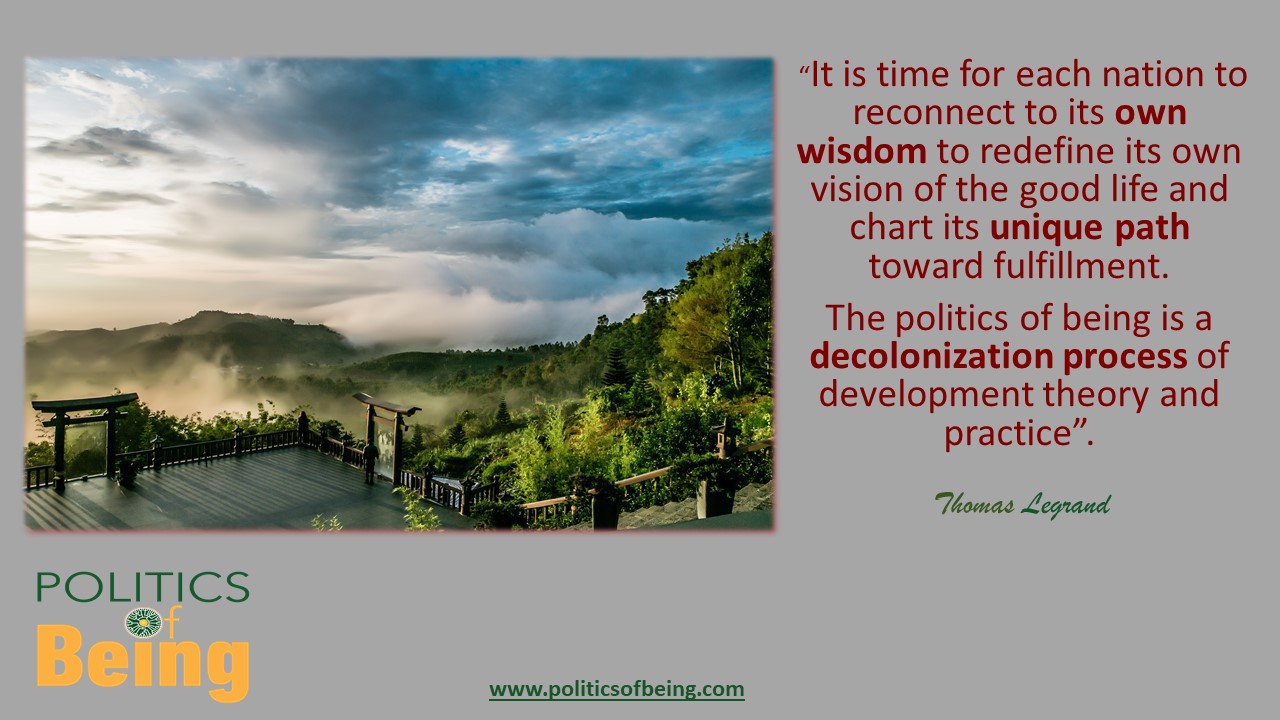
Politics of Being: a decolonization process of development theory and practice
It is time for each nation to reconnect to its own wisdom to redefine its own vision of the good life and chart its unique path toward fulfillment.
American sociologist Ronald Inglehart has shown that “sociocultural change is path dependent and cultural heritages are remarkably enduring.”[1] As each nation follows its own development path and may be at different stages of evolution, each one needs to define its version of the politics of being. As a nation’s cultural heritage shapes its political imaginary, traditional wisdom is the basis through which each nation can define its vision of the good life.
Indeed, while there are important universal aspects, the vision and routes to happiness and the good life seem to significantly vary across cultures. Americans, for example, have a hedonic view of happiness, strongly associated with high arousal positive states such as excitement and enthusiasm[2] in which personal achievements[3] and self-esteem,[4] for example, matter a lot.
The situation is very different in the East. Hong Kong Chinese associate happiness with lower arousal positive states (e.g., calm and relaxation),[5] and Japanese emphasize social harmony more as the source of happiness.[6] The Japanese view of happiness considers individuals as interdependent and understands happiness and unhappiness as ying-yang, both attracting each other. In Andean indigenous cultures, “living well” or “good living” means being in harmony with nature and one another, and various indigenous nations across South America are making explicit and advocating for their visions of the good life along these lines.
Like Andean cultures, many nations have a word or an expression to summarize this vision. In Costa Rica, “pura vida” (“pure life”) is the most common answer to the question “How are you”? It depicts the Costa Rican vision of the good life associated with simplicity, humility, nature, abundance, optimism, joy, and one’s capacity to just savor life.[7]
Unlike the pursuit of economic growth, which provided a single metric common to all nations—GDP—the politics of being calls for a qualitative, ethical, and culturally appropriate approach to development, which reflects and honors cultural diversity. It is a decolonization process of development theory and practice.
Through reconnecting to its traditional wisdom, each nation can offer as a gift to the world, its own “genius” and art of living, its own version of the politics of being.
[1] Inglehart 2018, 11
[2] Tsai and Park 2014
[3] Uchida and Kitayama 2009
[4] Diener and Diener 1995 showed a stronger association between self-esteem and life satisfaction in individualistic compared to collectivist cultures.
[5] Tsai and Park 2014
[6] Uchida and Kitayama 2009
[7] Apéstegui 2012
1.Inglehart, Ronald F. 2018. Cultural Evolution: People’s Motivations are Changing, and Reshaping the World. Cambridge: Cambridge University Press.
2 and 5. Tsai, Jeanne, and BoKyung Park. 2014. “The cultural shaping of happiness: The role of ideal affect.” In Positive Emotion: Integrating the Light and Dark Sides. Edited by Judith Tedlie Moskowitz and June Gruber, 345-62. New York, NY: Oxford University Press.
3 and 6. Uchida, Yukika, and Shinobu Kitayama. 2009. “Happiness and unhappiness in east and west: Themes and variations.” Emotion 9 (4): 441-56. https://doi.org/10.1037/a0015634
4. Diener, Ed, and Marissa Diener. 1995. “Cross-cultural correlates of life satisfaction and self-esteem.” Journal of Personality and Social Psychology 68 (4): 653-63. https://doi.org/10.1037//0022-3514.68.4.653
